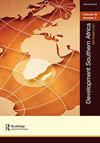采用参与式方法评估南非的水-能源-气候变化关系
IF 1.3
4区 经济学
Q3 DEVELOPMENT STUDIES
引用次数: 1
摘要
摘要本文采用参与式方法来评估南非对水-能源-气候变化(WECC)关系的理解水平。其目的是启动制定协调、系统和全面的战略,以促进对WECC及其在该国的影响的有效管理。评估遵循了水资源综合管理框架的经验教训,该框架促进了水资源管理的参与性方法。该文件表明,尽管对WECC的理解水平合理,但在避免气候影响的同时,仍不足以促进主要在水和能源资源政策制定和规划方面的综合方法。各利益攸关方之间的协调和协商有限,加剧了这种情况。然而,在WECC部门的管理中,促进综合方法的努力微乎其微。尽管有这些发展,该文件提出,参与式方法是可行的,可以促进被授权管理WECC部门的利益相关者之间的整体战略和合作。在体制框架内采取这种做法之前,这种联系将继续阻碍该国的可持续发展努力。本文章由计算机程序翻译,如有差异,请以英文原文为准。
Applying the participatory approach to assess the Water-Energy-Climate Change nexus in South Africa
ABSTRACT This paper uses a participatory approach to assess the level of understanding of the Water-Energy-Climate Change (WECC) nexus in South Africa. The aim is to initiate the development of well-coordinated, systematic, and holistic strategies to promote efficient management of the WECC and its implications in the country. The assessment follows the learnings from the Integrated Water Resource Management framework, which promotes a participatory approach in the administration of water resources. The paper reveals that, despite the reasonable level of understanding of WECC, it is still insufficient to promote an integrated approach mainly in policy development and planning for water and energy resources while averting climate impacts. This is exacerbated by limited coordination and consultation among various stakeholders. However, minimal efforts to promote an integrated approach in the management of the WECC sectors is observed. Despite these developments, the paper proposes that the participatory approach is feasible to promote holistic strategies and collaboration among stakeholders mandated to manage WECC sectors. Until approaches such as this are adopted within the institutional framework, this nexus will continue to impede the country's sustainable development endeavours.
求助全文
通过发布文献求助,成功后即可免费获取论文全文。
去求助
来源期刊

Development Southern Africa
DEVELOPMENT STUDIES-
CiteScore
4.20
自引率
7.10%
发文量
42
期刊介绍:
The Development Southern Africa editorial team are pleased to announce that the journal has been accepted into the Thomson Reuters (formerly ISI) Social Science Citation Index. The journal will receive its first Impact Factor in 2010. Development Southern Africa offers a platform for expressing views and encouraging debate among development specialists, policy decision makers, scholars and students in the wider professional fraternity and especially in southern Africa. The journal publishes articles that reflect innovative thinking on key development challenges and policy issues facing South Africa and other countries in the southern African region.
 求助内容:
求助内容: 应助结果提醒方式:
应助结果提醒方式:


